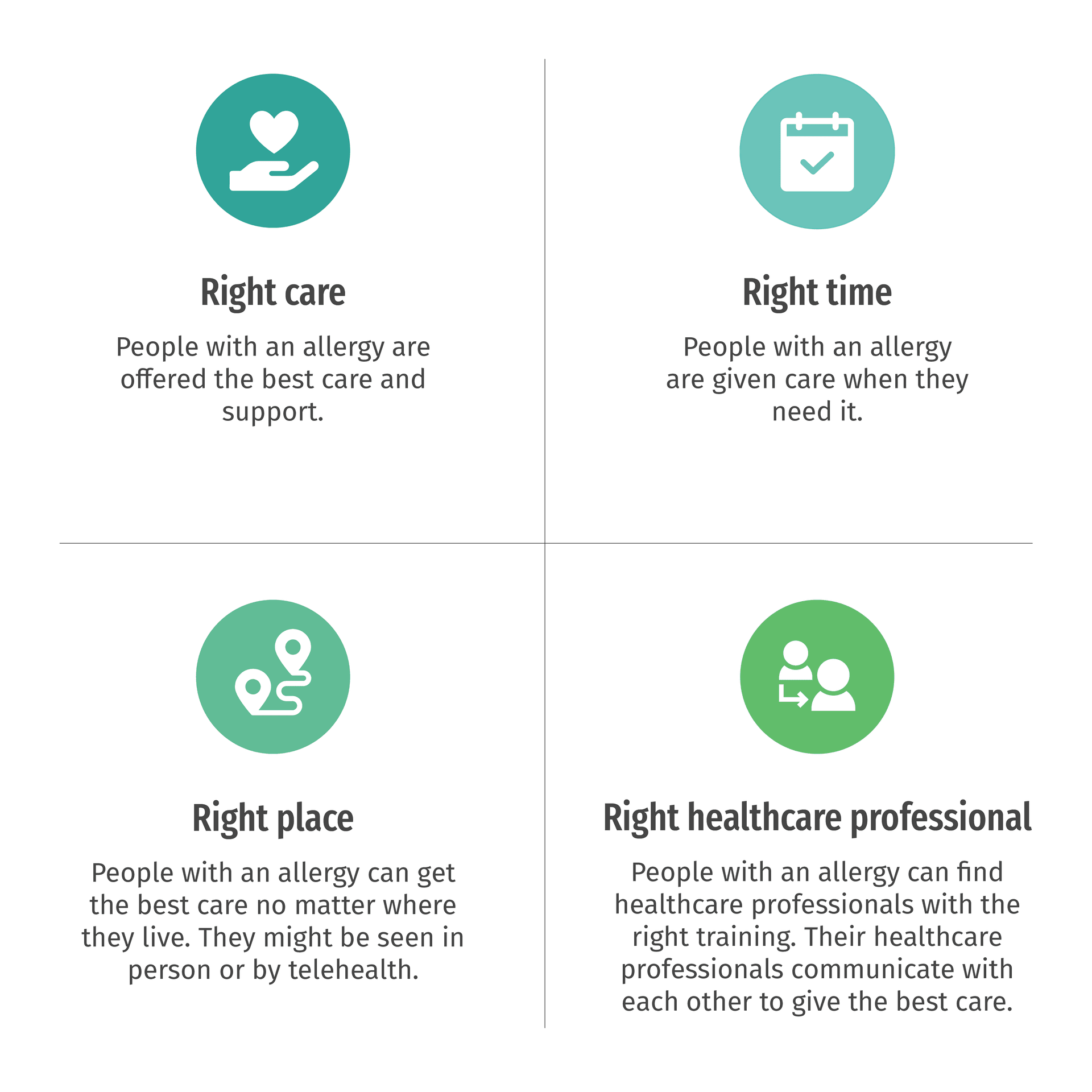
Shared Care for Allergy Program
Aims and Objectives
Empowering consumers and improving access to quality allergy care.
Enable consumers to access the right care, at the right time, in the right place from the right healthcare professional(s).
Education and training to increase knowledge about allergies and anaphylaxis.
Empower and support patients and families and improve their health literacy.
Build workforce capacity through innovative training models and collaboration between primary and tertiary care.
Develop standards of care for allergy.


What is Shared Care?
Shared care involves the person with allergy at the centre of their care. Their care is connected, consistent and coordinated across healthcare professionals, patient support organisations and the community. People are supported to receive the right care, at the right time, in the right place from the right healthcare professional(s). Allergy & Anaphylaxis Australia have information about the allergy healthcare team on their website.
Key features of shared care include:
Collaboration between primary care providers and specialists
Increased accessibility of allergy care
Improved health and quality of life outcomes
Who is involved in shared care?
Shared care involves the person with an allergy, their family and carers, healthcare professionals, patient support organisations and the community working together to give the best care. Allergy & Anaphylaxis Australia have information about the allergy healthcare team on their website.
How are we working towards this?
The shared care program involves:
Collaborations and partnerships:
Collaborate and engage with different healthcare professionals and organisations.
Pilot new ways of delivering allergy care to people living in regional, rural and remote areas.
Professional organisations to align training and standards of care
Health services and government agencies to support system-level changes.
Consultation:
Input and consultation with people living with allergies and their families, healthcare professionals, and professional interest holder organisations.
Looking at different ways to improve access:
Identify gaps and opportunities for shared care in current allergy care.
Develop models and pilots that include roles and responsibilities.
Develop education, training and resources to support healthcare professionals and consumers.
Monitor and evaluate outcomes.
Target audience
People with allergic conditions and their carers, healthcare professionals, health services and system level interest holders. This program has a specific focus on improving access to allergy care for people living in regional, rural and remote areas of Australia.
What we have achieved so far
Conducted a national consultation of key interest holders including consumers.
Developed a program roadmap to communicate about the work we are progressing.
Established an overarching Shared Care Working Group and Subgroups comprised of key interest holders and expertise to guide the program.
Established allergy assist®, a national allergy advice and education platform to support general practitioners and rural generalists, to improve access to timely and consistent allergy care, reducing waiting times and unnecessary travel, and support local care.
Developed the Associateship of Clinical Allergy course for general practitioners and paediatricians working in regional, rural and remote areas to build a regional workforce and network to support patients with allergies more locally, strengthen networks with clinical immunology/allergy specialists and tertiary services.
Released Australia’s first Transition of Care Standard, implementation guide and model of care for how allergy care should be delivered as young people move from paediatric to adult health services.

Work in progress
Collecting feedback and learning from the Allergy Care and Education Nurse Pilot to see whether nurse-led allergy clinics can improve access to allergy care in rural and regional areas.
We are currently developing a process for healthcare providers who have undertaken additional allergy training to be recognised as allergy healthcare providers.
We are currently developing an allergy healthcare professional finder platform linked to the recognition program for healthcare professional referral as well as for consumers to find an allergy healthcare professional.
More information
Stay informed about this program and future consultations
Keep up to date with the latest developments by subscribing to the Shared Care for Allergy Bulletin.
Follow the National Allergy Council social media on Facebook, Instagram, or LinkedIn.
